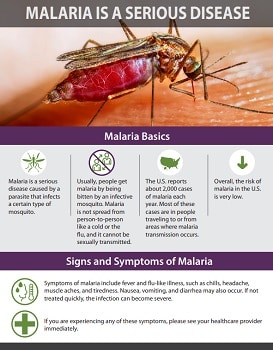Locally Acquired Cases of Malaria in Florida, Texas, Maryland, and Arkansas
CDC is currently collaborating with the Arkansas Department of Health (ADH) on one locally acquired case of Plasmodium vivax (P. vivax) malaria in a Saline County, Arkansas resident. The patient was treated and is now recovering.
Between May-August 2023, nine locally acquired cases of malaria were reported. This total included seven cases of P. vivax malaria in Sarasota County, FL, one case (P. vivax) in Cameron County, TX, and one case of P. falciparum malaria in a Maryland resident who lives in the National Capital Region. All patients were promptly treated at area hospitals and have recovered. There is no evidence to suggest that any of the cases are related.
Most malaria cases diagnosed in the United States are imported, usually by persons who travel to countries where malaria is endemic (regularly occurring). However, locally acquired mosquito-transmitted malaria cases can occur, as Anopheles mosquito vectors exist throughout the United States. The most recent cases were in 2003. Eight cases of locally acquired P. vivax malaria were identified in Palm Beach County, FL.
States have and continue to engage in additional surveillance activities and mitigation efforts to reduce the possibility of additional local transmission. CDC is coordinating with, and providing technical assistance to, state and local officials as requested.
Malaria is primarily spread by mosquitoes through feeding, often known as biting. The risk of locally acquired malaria is very low in the United States and these cases highlight the importance of prevention. This includes preventing mosquito bites, and rapid diagnosis, prompt treatment, and the use of malaria prevention methods when traveling to endemic areas. If you have traveled to an area where malaria occurs and develop fever, chills, headache, body aches, and fatigue, seek medical care urgently and tell your healthcare provider that you have traveled.
To prevent mosquito bites, use Environmental Protection Agency (EPA)-registered insect repellants, wear loose-fitted long-sleeved shirts and pants, and use screens on windows and doors.
In addition, medical providers are encouraged to routinely consider malaria in febrile patients with a history of travel to areas where malaria is transmitted, the diagnosis of malaria should also be considered in any person with fever of unknown origin regardless of travel history.
See the CDC malaria website for additional health information about malaria including prevention of mosquito bites and drugs for malaria prevention.
Read the Health Alert Network Health Advisory: Important Updates on Locally Acquired Malaria Cases Identified in Florida, Texas, and Maryland.
